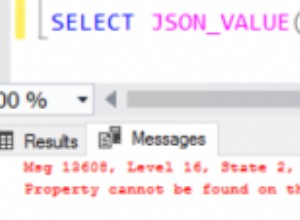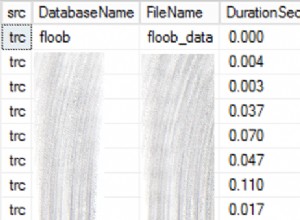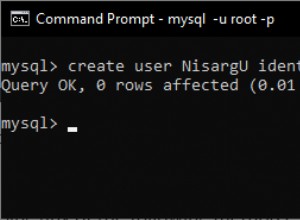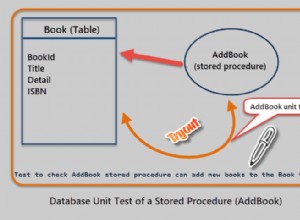vedere l'esempio seguente
SELECT mydate calendar_date
,EXTRACT(WEEK FROM mydate) week_num
,EXTRACT(month FROM mydate) month_num
,to_char(mydate,'Mon') month_name
,EXTRACT(Quarter FROM mydate) quarter_num
,EXTRACT(year FROM mydate) calendar_year
,EXTRACT(DOW FROM mydate) iso_dayofweek
,to_char(mydate, 'day') dayofweek_name
FROM (
SELECT now()::DATE mydate
) t
Risultato:
calendar_date week_num month_num month_name quarter_num calendar_year iso_dayofweek dayofweek_name
------------- -------- --------- ---------- ----------- ------------- ------------- --------------
2015/04/24 17 4 Apr 2 2015 5 friday
Puoi usare generate_series() per ottenere tutte le date in un anno, ad esempio:2015
select generate_series(0,364) + date'1/1/2015'
questo produrrà data da 1/1/2015 - 31/12/2015 e usa questa seleziona invece di SELECT now()::DATE nell'esempio fornito
Se vuoi creare una tabella per l'anno 2015 quindi puoi utilizzare la seguente query
CREATE TABLE mycal_2015 AS
SELECT row_number() OVER () date_key
,mydate calendar_date
,EXTRACT(WEEK FROM mydate) week_num
,EXTRACT(month FROM mydate) month_num
,to_char(mydate,'Mon') month_name
,EXTRACT(Quarter FROM mydate) quarter_num
,EXTRACT(year FROM mydate) calendar_year
,EXTRACT(DOW FROM mydate) iso_dayofweek
,to_char(mydate, 'day') dayofweek_name
FROM (
SELECT generate_series(0, 364) + DATE '1/1/2015' mydate
) t
e la tabella apparirà come select * from mycal_2015
date_key calendar_date week_num month_num month_name quarter_num calendar_year iso_dayofweek dayofweek_name
-------- ------------- -------- --------- ---------- ----------- ------------- ------------- --------------
1 2015/01/01 1 1 Jan 1 2015 4 thursday
2 2015/01/02 1 1 Jan 1 2015 5 friday
3 2015/01/03 1 1 Jan 1 2015 6 saturday
4 2015/01/04 1 1 Jan 1 2015 0 sunday
5 2015/01/05 2 1 Jan 1 2015 1 monday
6 2015/01/06 2 1 Jan 1 2015 2 tuesday
...
.
.
.
364 2015/12/30 53 12 Dec 4 2015 3 wednesday
365 2015/12/31 53 12 Dec 4 2015 4 thursday
POSTGRESQL:FUNZIONE ESTRATTO
La funzione di estrazione di PostgreSQL estrae parti da una data
Sintassi :extract( unit from date )
date è un valore di data, timestamp, ora o intervallo da cui deve essere estratto il datepart.
unità è il tipo di unità dell'intervallo come giorno, mese, minuto, ora e così via
Può essere uno dei seguenti:
unit description
--------------- -----------------------------------------------------------------------------------------------------------------------------
century Uses the Gregorian calendar where the first century starts at '0001-01-01 00:00:00 AD'
day Day of the month (1 to 31)
decade Year divided by 10
dow Day of the week (0=Sunday, 1=Monday, 2=Tuesday, ... 6=Saturday)
doy Day of the year (1=first day of year, 365/366=last day of the year, depending if it is a leap year)
epoch Number of seconds since '1970-01-01 00:00:00 UTC', if date value. Number of seconds in an interval, if interval value
hour Hour (0 to 23)
isodow Day of the week (1=Monday, 2=Tuesday, 3=Wednesday, ... 7=Sunday)
isoyear ISO 8601 year value (where the year begins on the Monday of the week that contains January 4th)
microseconds Seconds (and fractional seconds) multiplied by 1,000,000
millennium Millennium value
milliseconds Seconds (and fractional seconds) multiplied by 1,000
minute Minute (0 to 59)
month Number for the month (1 to 12), if date value. Number of months (0 to 11), if interval value
quarter Quarter (1 to 4)
second Seconds (and fractional seconds)
timezone Time zone offset from UTC, expressed in seconds
timezone_hour Hour portion of the time zone offset from UTC
timezone_minute Minute portion of the time zone offset from UTC
week Number of the week of the year based on ISO 8601 (where the year begins on the Monday of the week that contains January 4th)
year Year as 4-digits
Nota:la funzione Estrai si applica a PostgreSQL versione 8.4 e successive
Funzioni e operatori data/ora
genera_serie()




